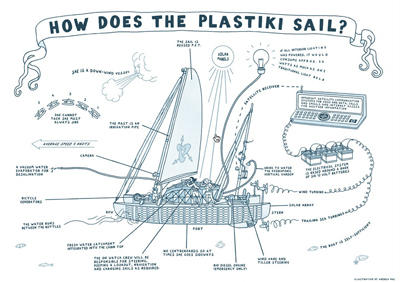The ‘Plastiki’ spotlights plastic pollution on its transpacific voyage
 The Plastiki — the world’s first boat made of recycled plastic bottles — recently set off on its journey across the Pacific. The Plastiki is made of recycled 2-liter bottles; some 12,000 of them give the boat its buoyancy.
The Plastiki — the world’s first boat made of recycled plastic bottles — recently set off on its journey across the Pacific. The Plastiki is made of recycled 2-liter bottles; some 12,000 of them give the boat its buoyancy.
The goal of the project is to raise awareness about plastic waste in the ocean, which, sadly, most vagabonds contribute to when we buy bottled water abroad.
Did you know that more than 90 percent of all plastic materials are not recycled? Plastics also account for 60-80 percent of all marine pollution. And perhaps the most disturbing statistic on the project’s website: for every liter of bottled water that’s manufactured, another two liters of water are used to make it.
Bottled water in the west is easy to avoid — after all our tap water is perfectly drinkable — but it’s tougher when you’re abroad in Africa, Asia and South America where the local water supply is suspect at best and sometimes even dangerous.
True, you could pack a water filter. I did the first time I went traveling, but I rarely used it and I’ve never met another traveler who did.
The company behind the SteriPEN is sending Vagablogging a sample UV filter for testing. I’ll be sure to let you know how it works. But in the mean time, if anyone has any clever ideas on how to avoid bottled water abroad be sure to let us know in the comments below.
I should also point out that the Plastiki’s voyage across the Pacific isn’t just about plastic and environmental issues. Another inspiration for the project (and the name, Plastiki) is Thor Heyerdahl’s 1947 Kon-Tiki expedition.
Heyerdahl crossed the Pacific in reproduction of an Inca raft to prove it was possible early civilizations made extended sea voyages. Among the Plastiki’s six crew members is Olav Heyerdahl, Thor’s grandson.
To follow the Plastiki’s voyage across the Pacific, and to learn more about plastic and ocean pollution, check out the Plastiki website or follow the project on Twitter or Facebook.

March 23rd, 2010 at 1:14 pm
I haven’t personally tried this, but I plan on buying one to take with me to Peru this summer. I saw it on the Vagabondish site and it could definitely help to eliminate water bottle usage by vagabonders: https://www.911water.com/Personal-Portable-Water-Filter-Bottle-p/pfwb.htm.
March 23rd, 2010 at 3:29 pm
i know it isn’t much, but when i’m staying in one place for long enough (or traveling with enough people to make it count, i prefer to buy the giant jugs of water and use them to fill my smaller, reusable bottle. it’s not a lot, but it’s definitely cheaper and i figure any reduction in packaging is better than none. I’d love to hear what other people do, since in so many countries recycling doesn’t really exist and the water isn’t safe. Luckily, i’m in Cuba right now and people here reuse everything, so recycling doesn’t even come up.
March 23rd, 2010 at 10:49 pm
This is a good topic to bring up and talk about. I like to fill up my water bottle at at the hotel I’m staying at once I’ve confirmed that the water is okay to drink. Another way to get around buying bottled water all the time is to drink bottled beer and drink it right from the bottle. That way you don’t have to be concerned if the glass they handed you is clean or not. Also that is one less glass to clean as well thus saving more water and fuel to heat the water to clean the glass that you didn’t need in the first place! Also, many places in Asia, Central and South America have fantastic fruit juices that are very cheap and good for you. Besides, when you get back home you’ll kick yourself for not trying out all that exotic beers and juices!
March 24th, 2010 at 4:00 am
I just came across the following article, from Joel’s travel blog (he’s on a rtw trip right now). https://jtrek.blogspot.com/2010/02/travel-tip-clean-drinking-water.html
March 24th, 2010 at 8:56 am
If everyone recycled plastic, glass, cardboard, etc…the ocean would not be polluted with garbage. Recycling is a “no-brainer” because it’s easy and could create jobs. The more recycling plants that are implemented across the world means jobs for citizens.
I agree with Don. Once you know the water is drinkable, fill up a water bottle bottle or two and carry them with you when you’re traveling.